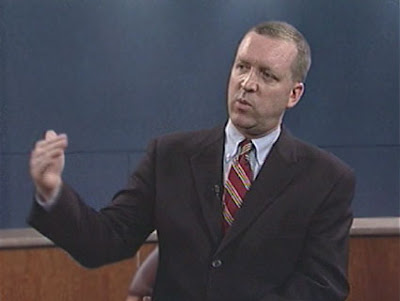Tom Barnett answers an important question
A connected World
The first, comes by way of Thomas P.M. Barnett in response to questions from a college student. Barnett's answers are solid gold advice for any person who interested in making a serious difference in the world. I was stimulated to pursue my current course after picking up his first book, The Pentagon's New Map back in the Spring of 2004. Barnett's horizontal thinking philosophy meshed with my own constant need to keep seeking new targets and subjects to uncover. Barnett answers three questions which pretty much chart out a pathway for any one seeking a rewarding future, where to quote Barnett's father is; "Making your natural hobby you career and getting paid for it." As a father, and teacher, I find Barnett's response perfectly suited for today's youth who have grown up on multi-tasking and used to constant change with each new technology advance. Here are the questions and a sample of Tom's answers.
How did you translate a career from being a Cold War analyst to an idea generator?
I didn't really. I wasn't really ever a "Cold War analyst," despite my training. In truth, I would have been magnificently unhappy if I had stayed a classic academic or become an intell analyst - or if the Cold War hadn't ended. I just have no staying power on subjects, defined by me as working a particular field for years and years as many people do. It just would have driven me insane. The longer I get trapped in one subject, the more depressed I become. I truly get off on drawing linkages between things versus cracking nuts on any one subject.
Is there any advice you have for students who are interested in making a serious difference in the world?
How did you develop your philosophies?That's an inherent skill set for thinking laterally/horizontally, and since you will be changing subject matters constantly, the key is to develop your preferred tool kit of analytic approaches. There is no set way to do this, in my mind, you just want to consciously collect great analytic tricks, maneuvers, procedures as you go along. I probably have about three dozen that I use over and over again in all sorts of subject areas, because I've come to trust them in terms of the revealed output. So you think of them as tracking tricks, like stuff I always do when I'm canoeing a new river. Not the fastest route, but one that rewards you in the accumulation of impressions that lead to analysis. Being observant is everything. Analytically, my whole life feels like one big deja vu, meaning I am constantly saying to myself, "I think I've spotted this dynamic somewhere else before."
Read the rest:By constantly seeking out the most interesting and fear-filled work I could find, subjects where, by most accounts I had no business trying to forge new thinking (Isn't there somebody more established who can crank out an answer we all know and love - in advance?). If I don't feel over my head on some level, I don't like the work as a rule, unless the balancing factor is some insane ambition or unusually deep-in-the-future scope that allows a whacked amount of freedom in approach. One of those three factors needs to be in place.
Questions from OH college student
diaper recycling plant
Someday Starbucks will be the only name?
This next article comes from Steve DeAngelis, CEO of Enterra Solutions and the fine blog Enterprise Resilience Management. Steve turns his attention in this post to the three "R's" with a twist where before they meant; reading, riting, and rithmathic, they now mean; reuse, recycle, and repurpose.
Here is an example of a few of the things being recycled.When companies think about waste, they think about shrinking profit margins. Every effort is made to reduce waste so that profit margins can be increased. I suspect that consumers won't get serious about waste reduction and recycling until they see waste in terms of dollar signs as well. Since Americans continue to increase the per capita amount of waste they generate rather than reduce it, it is apparent that generating waste has yet to hit them in their pocketbooks in a significant way. Fortunately, there are a number of entrepreneurs and established companies that do take waste seriously because they have realized that there is money to be made from recycling waste. In America, the three "R's" used to stand for: reading, 'riting, and 'rithmetic. Today the three "R's" stand for: reuse, recycle, and repurpose.
"DIRTY DIAPERS -- A plant in Quebec turns soiled diapers into fuel. Using a method called pyrolysis, the plant heats up the diapers without oxygen. That breaks down the molecules of both the diapers and their, um, contents, yielding synthetic methane gas and diesel-like oil.
"COFFEE -- Coffee grounds can consist of up to 20 percent oil, making them an abundant source of biofuel. Researchers at the University of Nevada-Reno have separated oil from grounds and turned it into biofuel. The result even smells like your favorite java joint."
Maybe we will soon see Starbucks in competition with AM-PM where you can fuel up as you get your latte. The bottom line is this is another example of people thinking horizontally and laterally versus the vertically structured existence of the past half century where many have become slaves wearing blinders to the possibilities on the horizon."URINE -- Ohio University's Gerardine Botte can convert urine to hydrogen, which is used to make electricity. While it's hard to collect enough human urine to make the process commercially viable, it may be a boon for hog farmers, who have trouble disposing of pig urine.
Read more:
From Waste to Wealth
Enjoy reading, and if your a parent, pass Barnett's wisdom along to your son or daughter to consider as they plan their future path.






No comments:
Post a Comment